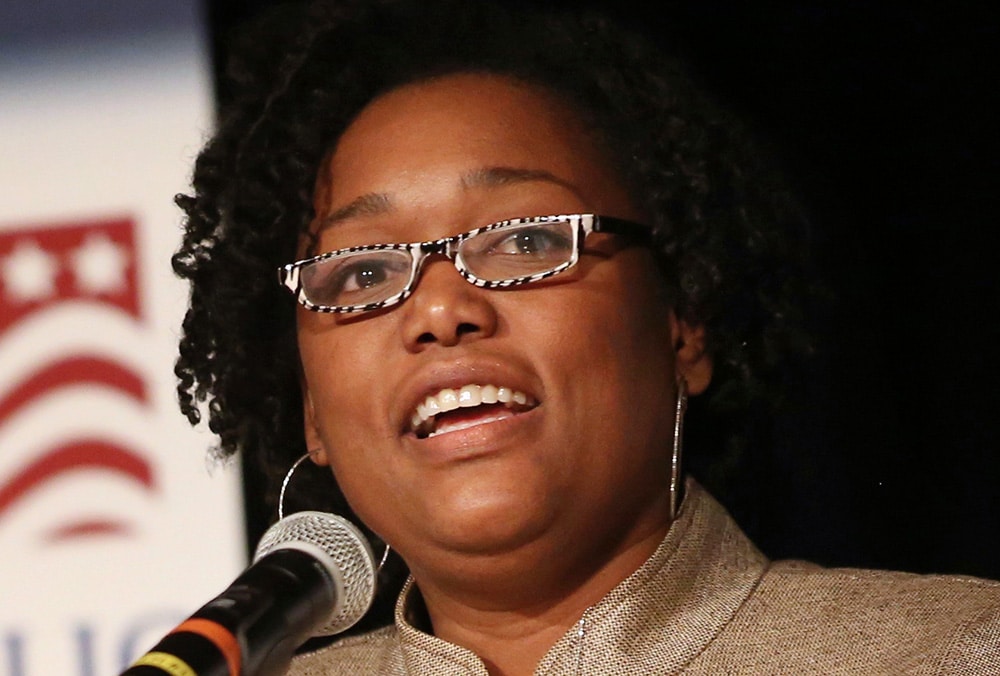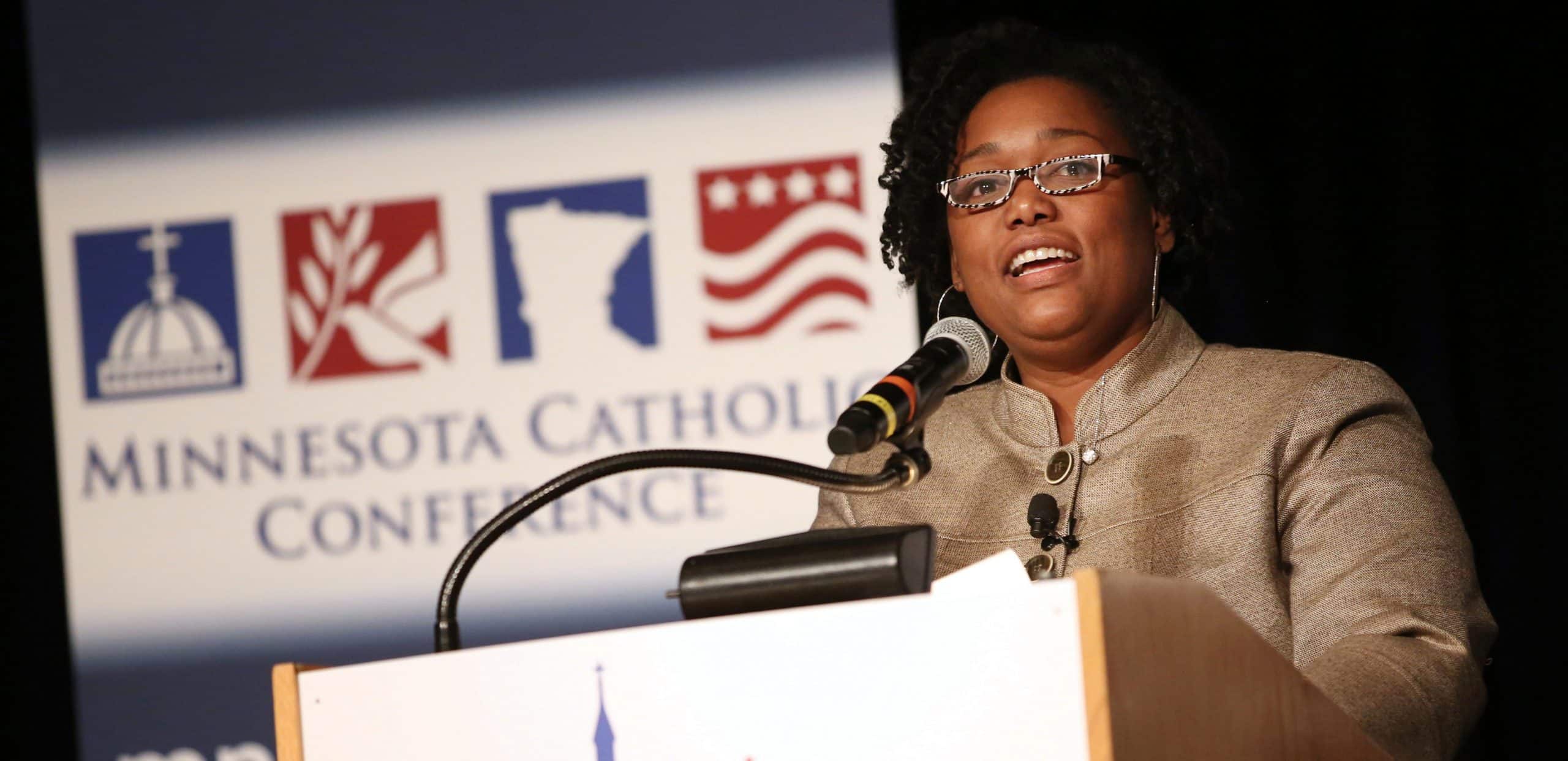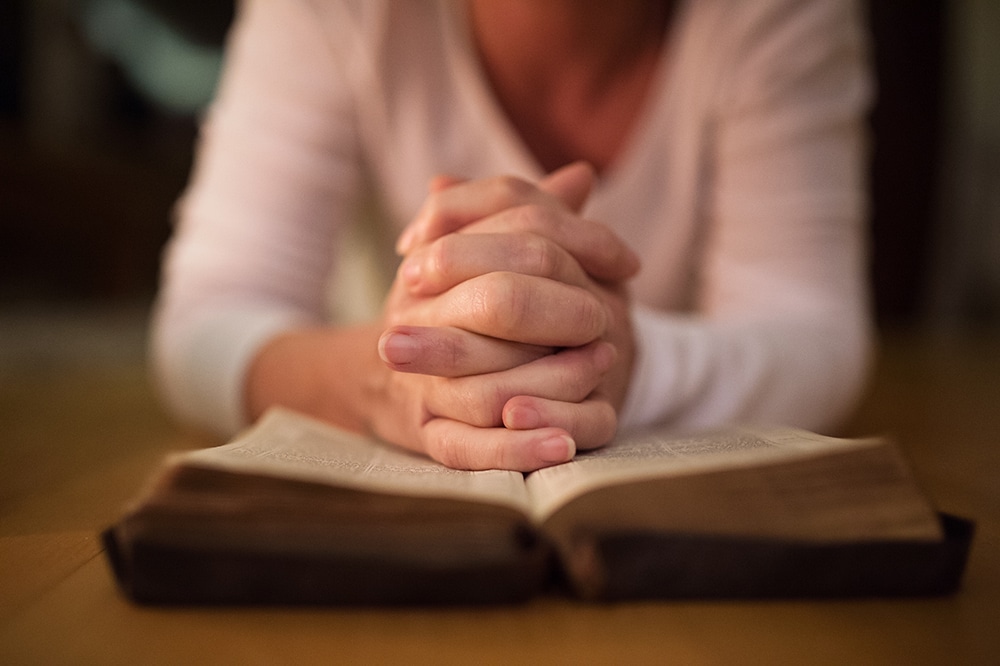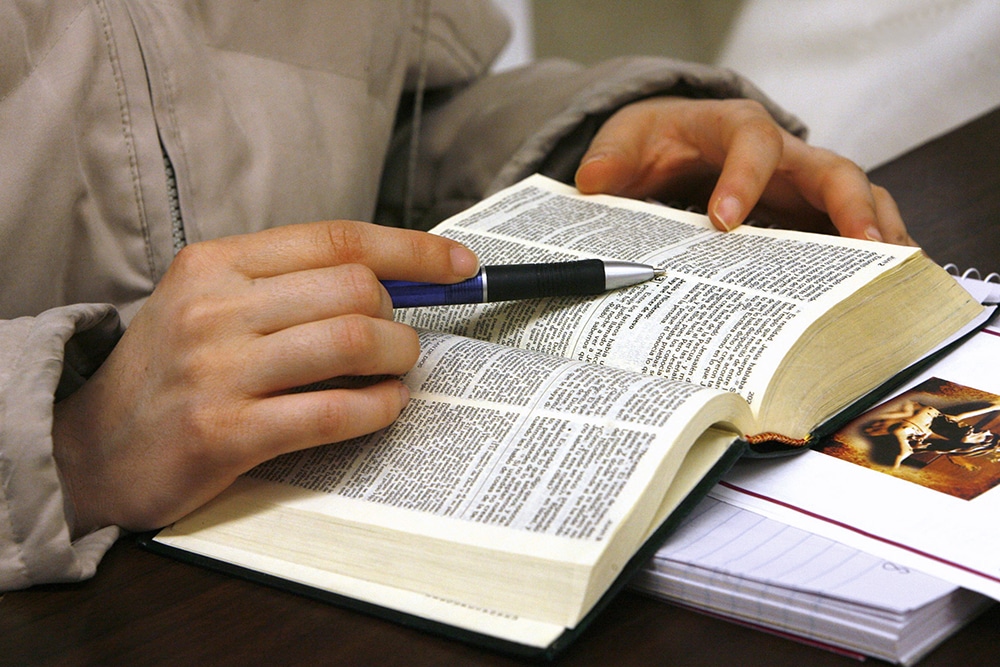Gloria Purvis’ radio show and Twitter feed have become go-to destinations for Catholics interested in learning about the history and nature of racism in the United States and how the call to racial justice comports with the Gospel.
However, Purvis’ more active stance on race relations — sparked in large part by the killings of George Floyd, Breonna Taylor and Ahmaud Arbery, among several recent examples — also has provoked vitriol and racist insults from often anonymous individuals who accuse her of race-baiting and sacrilege when she tweets about racism and shares images of Black Catholic iconography.
“We have people who are very forcefully trying to deflect and derail the conversation, and it’s most disappointing when you see that kind of vitriol coming from your fellow Catholics,” said Purvis, the host of the EWTN radio show “Morning Glory.”
Purvis, a member of the National Black Catholic Congress’ Leadership Commission on Social Justice, has long been involved in the pro-life movement. She is a board member for the Northwest Pregnancy Center and chairperson of Black Catholics United for Life. In a recent interview with Our Sunday Visitor, Purvis described how she sees the movement for Black equality as synonymous with her pro-life activism.
Our Sunday Visitor: How is racism a life issue?
Gloria Purvis: First, it doesn’t mean that we don’t seek the legal protection of the child in the womb. I think that’s what everybody is so worried about. What it means is that because we believe in the dignity of the person from the womb to the tomb, we have a Gospel imperative to protect and defend the oppressed and vulnerable. We then have, by our Gospel call, a responsibility to defend the lives of people who are the subject of being treated unjustly because of their race.
So we need to look at not only personally racist behavior but what some people call structures of sin, which is perhaps an easier way to consider systemic racism — cultural practices, attitudes and traditions that are racist and which lead to a diminishment of Black people as human persons. We should be examining all that, because those are the many things that lead to police brutality, that lead to the devaluing of Black lives across the board, whether it’s substandard medical care, negative outcomes in education and housing. All these things come into play. At some point, someone made a deliberate decision to enact policies that on their face may not have explicitly said, “We’re going to harm this community,” but their intention was to do so, and the way these laws and practices are followed has most definitely led to that.
Our Sunday Visitor: What kind of reactions have you received to your radio segments and social media posts on racism?
Purvis: You have people who are openly hostile and angry, and don’t want me to talk about it anymore, so they’d like to eliminate any access I have to a platform to be able to speak. They outright deny that racism exists. They call me a race-baiter. They resort to name-calling, because they don’t want to confront the reality of this situation and have a conversation that is really difficult.
I’ve also had some positive experiences with people writing to me saying, “Thank you. I’ve never heard these things before, and it’s led to some self-reflection.” I will say, though, that the overwhelming hatred is palpable. So it is a light in the darkness to have people who say, “We understand this. We support you. We want to change things because we want to serve the Lord.”
Our Sunday Visitor: Where do you think the anger and hostility come from?
Purvis: The Devil. I honestly think racism is demonic. I think it’s something we’ve never bothered to contend with seriously in this country. We haven’t done it on a spiritual level. We haven’t done it in terms of our policies to really try to effect change. We’ve done things like the Civil Rights Act and the Voting Rights Act, which are good, but I think we still have far to go.
There is this attitude of, “Why aren’t you satisfied, Black people? It’s better than what it was.” That is an unfair question. Why should we be satisfied with anything less than being considered sons and daughters of the King and treated with that same dignity and respect that we deserve? To be satisfied with anything less than that is to be satisfied with anything less than the Gospel, and that’s not what we want.
Our Sunday Visitor: In recent years, we’ve seen episodes of racial unrest after the police killings of Freddie Gray in Baltimore and Michael Brown in Ferguson, Missouri. What makes the present moment different?
Purvis: I think the brutality and coldness of the murder of George Floyd, the length of it, and being captured on film; I think all that makes a difference. With George Floyd, we saw in no uncertain terms the kind of brutality that Black people have been talking about for decades.
There was a time in the United States when Black people couldn’t testify in court because their testimony was not considered to be trustworthy. Only a white person could testify, and only their witness could be trusted in court cases. So it feels like that right now in the sense that what Black people have been talking about for decades and what we’ve been saying all this time has been discounted. Well, now we’ve got it on video, and very clearly on video.
Our Sunday Visitor: Are we seeing a national reckoning with racism?
Purvis: I think so. Black people are tired. We’re fed up. I think people are past the point of caring and wanting to continue to dialogue with white people who are refusing to accept evidence that’s right in front of them. That part scares me, because when we get past the point of wanting to dialogue, I don’t know what’s next. But people are angry — rightfully so. And it isn’t just from George Floyd. It isn’t just from Ahmaud Arbery. It isn’t just from Breonna Taylor, Tamir Rice or Eric Garner. These are things that have been happening for generations.
Our Sunday Visitor: When a white person tells you that systemic racism doesn’t exist, what do you think?
Purvis: You know, I doubt they’ve even engaged with what the term means. I doubt they’ve read about it. A lot of times I don’t think they know what systemic racism is. They’ve not encountered any of these things. I think they’re just parroting stuff they’ve heard from whoever they follow on television or the radio. They haven’t deeply and seriously engaged with the matter. They’ve been walking through this world only with their own perspectives, and they intend to keep it that way. I mean, people in our Church know clericalism exists and yet they don’t ask for statistics.
Our Sunday Visitor: How have you been impacted personally by racism, both in society and in the Church?
Purvis: I grew up in the cradle of the Confederacy [in South Carolina]. I remember as an elementary school girl, coming home from Catholic school, waiting on the bus in downtown Charleston, when a pickup truck of Citadel cadets drove by. One guy pretend-aimed at me like he had a rifle or gun and he was shooting me dead. And I just remember the vulnerability standing out there as a child at that moment and thinking to myself, “Why?”
Another thing I am willing to share is one time where I experienced racism in Catholic school. In high school, when I was a junior, I had just been elected to be the senior class president the following year. The juniors were all called to the gymnasium to talk about buying our class rings. When the guidance counselor stood up to announce me as the incoming senior class president, the guy who was selling the rings to us was appalled and disgusted. I remember this grown man, in his 50s, talking to the guidance counselor like, “She’s the senior class president?” The guidance counselor said, “Yeah, these kids are really different now.” And that’s a very mild example.
Our Sunday Visitor: For Catholics who want to seriously engage the issue of racism and be an ally for people of color, what can they do?
Purvis: Challenge people. Call them to the carpet when they make casual racist statements. Call them out when they mock things. They need to be challenged and made to realize that what they’re doing is putting their own souls in jeopardy. The devil has got a foothold in these people’s lives. I think sometimes when other white people call them to task, they hear it better. When you already come from a place of not respecting Black people, you can’t hear when a Black person is lovingly encouraging you to reconsider. They simply can’t hear it. But from white people, who they automatically take as serious interlocutors, they perhaps can hear it. Engage with those people, lovingly.
Our Sunday Visitor: “Black Lives Matter” as a call to action seems to be a stumbling block for some Catholics because of the progressive politics of the co-founders of Black Lives Matter Inc. What do you say to that?
Purvis: You know, many of the same people who haven’t studied or read anything about systemic racism have a lot of time to get on the internet and search up and down about Black Lives Matter Inc. So it’s not that they don’t have the agency and ability to search and study from good sources. It’s that they don’t have the desire. They refuse to make distinctions between understanding that the phrase “Black Lives Matter” is not de-facto membership in the organization. They want to spend time talking about what’s wrong with this organization here, and I’m like, “A man died in the street.”
That’s why I think all this focusing on an organization rather than on the cause is so silly. That group does not have a monopoly on truth. They don’t own the movement. We all have a place in this. We can be involved in the racial justice movement from our own Catholic perspective. There’s nothing stopping us. There’s nothing wrong with us doing that. In fact, we should be doing these things.
Our Sunday Visitor: Despite the pushback, do you intend to keep highlighting racial justice on your radio show and Twitter feed?
Purvis: Oh yes, and what sustains me is prayer, prayer and more prayer. When you spend time meditating on the Lord, I can’t describe the love that I feel, the love that I know is there. I couldn’t imagine it any other way.
The truth also sustains me. I don’t know why, but I’ve just never been the person who’s too afraid to speak the truth among my Catholic brothers and sisters or even at work. When I worked in corporate America, I remember people saying things about the Catholic Church and I’d respond, “Actually, that’s not correct. This is what we believe.” I don’t see myself stopping now, because Our Lord hasn’t stopped. He’s bringing us the truth, and as time unfolds and new things that are evil and contrary to the Gospel are presented to us, we need to speak and clarify what is beautiful, good and true. So yes, I don’t see myself stopping unless the Lord wants me to stop. Until then, I’m going to keep on keeping on.
Brian Fraga is a contributing editor for Our Sunday Visitor.





